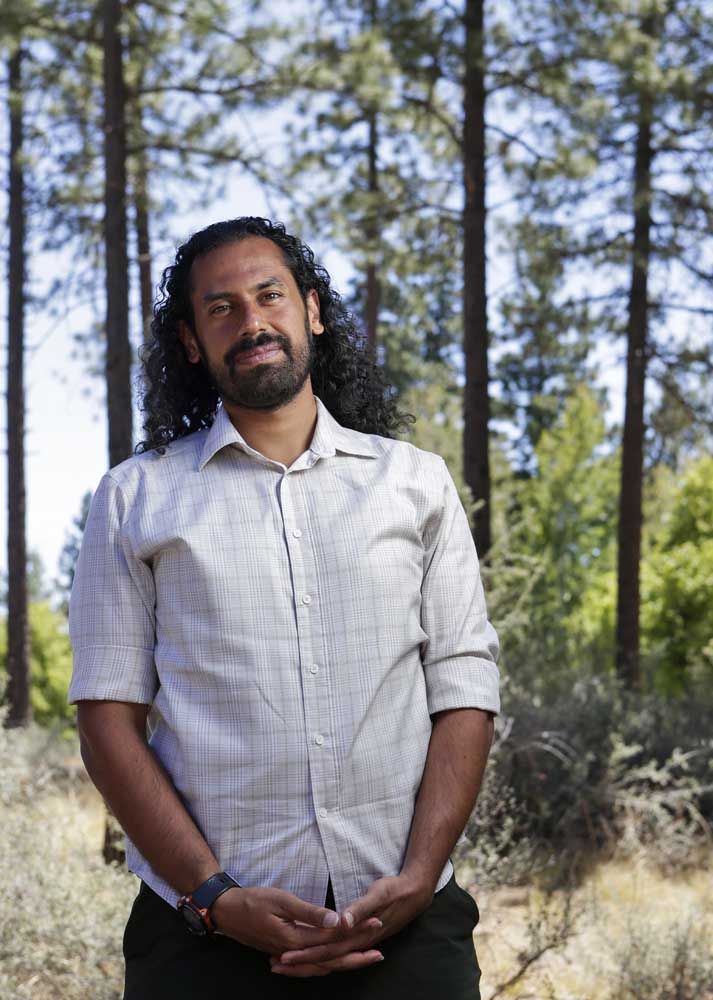Bend professor awarded $2 million for drinking water project
Published 12:00 am Monday, July 2, 2018

- ORIG 06/27/18 Oregon State University-Cascades assistant professor Bahman Abbasi stands for a portrait outside the campus in Bend on Wednesday, June 27, 2018. Abbasi is being awarded a $2 million Department of Energy grant to study desalination. (Joe Kline/Bulletin photo)
An Oregon State University-Cascades professor was recently awarded a $2 million federal grant to create a portable, solar-powered device that can roll up to an ocean shore and turn salt water into drinkable water.
The U.S. Department of Energy grant, the largest award in OSU-Cascades history, is part of the federal agency’s Solar Desalination program that is using $21 million to fund 14 projects nationwide that explore using solar energy to create freshwater from undrinkable seawater.
OSU-Cascades is now tasked with one of those projects.
Bahman Abbasi, 35, an energy systems engineering professor, will lead a team of researchers from OSU-Cascades, Michigan State University, the University of Maryland and the University of Nevada-Reno to develop the solar-powered desalination technology.
Currently, the idea exists only on paper.
Abbasi said the ultimate goal of the three-year project is to help a more sustainable energy future for the United States.
“The biggest motivation is to help move the U.S. in that direction so we can use a sustainable source of energy to produce sustainable water and eventually sustainable agriculture,” he said.
Abbasi partnered with colleagues from the other three universities to apply for the federal grant. He spent the past couple of years designing a prototype and was helped this past school year by students at OSU-Cascades.
Abbasi, who earned a Ph.D. in mechanical engineering from the University of Maryland in 2010, has worked in a variety of industries, including natural gas pipes manufacturing and automotive development; he also worked as a lead engineer at General Electric. In addition, he worked as an associate at Booz Allen Hamilton, an information technology consulting company, before joining OSU-Cascades last year.
An important key to the project is the size of the desalination equipment, he said.
Traditionally, the desalination process is done in large buildings. The focus of Abbasi’s project is to design modular containers that filter the salt water and fit in a vehicle that can easily transport the technology to remote areas. The whole system would be powered by solar panels.
Once complete, the technology could be used across the United States, and also in African and Middle Eastern countries that lack access to clean water.
“Fresh water is an increasingly scarce resource in many regions around the globe,” Abbasi said. “Our goal is to develop a transportable and off-grid desalination system that can be used along coastlines, other bodies of water, or in conjunction with existing desalination plants to deliver fresh drinking water to water-stressed communities, particularly those most in need.”
Work on the project will begin Sept. 1.
Abbasi is recruiting a team of six researchers. The team will include a postdoctoral researcher, two Ph.D. students, two graduate students and a rotating position for an undergraduate student.
Creating the desalination system will be Abbasi’s main academic focus for the next three years.
“All I can think about is getting this underway and hitting the ground running,” he said.
— Reporter: 541-617-7820, kspurr@bendbulletin.com








